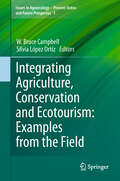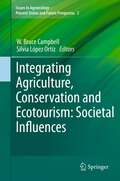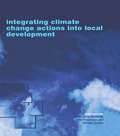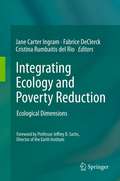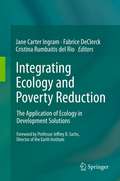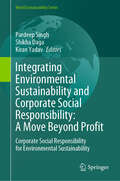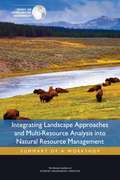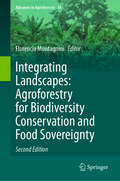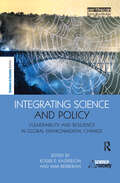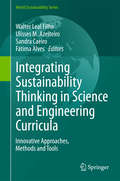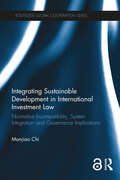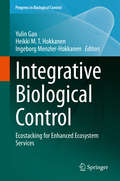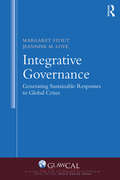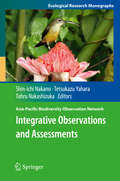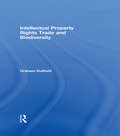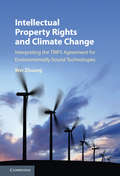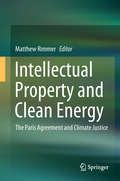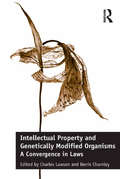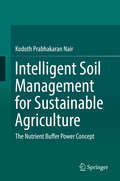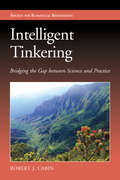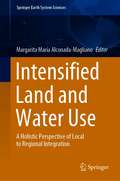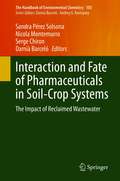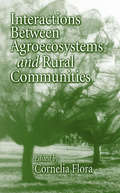- Table View
- List View
Integrating Agriculture, Conservation and Ecotourism: Examples from the Field
by W. Bruce Campbell Silvia López OrtízIssues In Agroecology - Present Status and Future Prospectus not only reviews aspects of ecology, but the ecology of sustainable food production systems, and related societal and cultural values. To provide effective communication regarding status and advances in this field, this series connects with many disciplines such as sociology, anthropology, environmental sciences, ethics, agriculture, economics, ecology, rural development, sustainability, policy and education, and integrations of these general themes so as to provide integrated points of view that will help lead to a more sustainable construction of values than conventional economics alone. Such designs are inherently complex and dynamic, and go beyond the individual farm to include landscapes, communities, and biogeographic regions by emphasizing their unique agricultural and ecological values, and their biological, societal, and cultural components and processes.
Integrating Agriculture, Conservation and Ecotourism: Societal Influences
by W. Bruce Campbell Silvia López OrtízAgroecology not only encompasses aspects of ecology, but the ecology of sustainable food production systems, and related societal and cultural values. To provide effective communication regarding status and advances in this field, connections must be established with many disciplines such as sociology, anthropology, environmental sciences, ethics, agriculture, economics, ecology, rural development, sustainability, policy and education, or integrations of these general themes so as to provide integrated points of view that will help lead to a more sustainable construction of values than conventional economics alone. Such designs are inherently complex and dynamic, and go beyond the individual farm to include landscapes, communities, and biogeographic regions by emphasizing their unique agricultural and ecological values, and their biological, societal, and cultural components and processes.
Integrating Climate Change Actions into Local Development
by John Robinson Livia Bizikova Stewart CohenTo date, climate change adaptation and mitigation have been treated separately both in research and in the climate negotiations. However, a growing body of literature is now being developed that points to actual and potential synergies and trade-offs between responses to climate change and sustainability. This literature has evolved in a spontaneous way with diverse approaches and no common methodology to help practitioners explicitly plan for these synergies. This special issue of the Climate Policy journal addresses this gap between scientific knowledge and practitioners' needs by focussing on linkages between climate change and sustainable development at the level of conceptual framework and methods. In particular, the papers address in an integrated way local development options involving both adaptation and mitigation in order to promote resilience to climate change in human and natural systems. The special issue provides policy and methodological guidelines for linking local deveopment pathways with responses to climate change, based on collaboration between local practitioners, the public and scientists.
Integrating Ecology and Poverty Reduction: Ecological Dimensions
by Cristina Rumbaitis del Rio Fabrice Declerck Jane Carter IngramIn the past, the science of ecology has frequently been excluded from the development agenda for various reasons. Increasingly however there has been a renewed interest in finding more ecologically sustainable means of development that have required a strong foundation in ecological knowledge (for example EcoAgriculture Partnerships, EcoHealth presented at ESA, and EcoNutrition proposed by Deckelbaum et al). Each of these examples has already taken the critical first step at integrating ecological knowledge with agriculture, health and nutrition, respectively. However, this is only the first step; more attention needs to be placed not only on the role that two fields can play towards poverty alleviation, but on the role of a truly integrated, interdisciplinary approach towards development goals that is firmly grounded in ecological understanding. We feel that a critical look at what ecology can and cannot provide to the development agenda, in light of the Millennium Development goals, is timely and crucial. The introduction and the final section of the book will then integrate the lessons and principles outlined in each of the chapters. All chapter authors will be heavily encouraged to focus on how their sub-discipline in ecology impacts overall human well-being and environmental sustainability.
Integrating Ecology and Poverty Reduction: The Application of Ecology in Development Solutions
by Cristina Rumbaitis del Rio Fabrice Declerck Jane Carter IngramIn the past, the science of ecology has frequently been excluded from the development agenda for various reasons. Increasingly however there has been a renewed interest in finding more ecologically sustainable means of development that have required a strong foundation in ecological knowledge (for example EcoAgriculture Partnerships, EcoHealth presented at ESA, and EcoNutrition proposed by Deckelbaum et al). Each of these examples has already taken the critical first step at integrating ecological knowledge with agriculture, health and nutrition, respectively. However, this is only the first step; more attention needs to be placed not only on the role that two fields can play towards poverty alleviation, but on the role of a truly integrated, interdisciplinary approach towards development goals that is firmly grounded in ecological understanding. We feel that a critical look at what ecology can and cannot provide to the development agenda, in light of the Millennium Development goals, is timely and crucial. The introduction and the final section of the book will then integrate the lessons and principles outlined in each of the chapters. All chapter authors will be heavily encouraged to focus on how their sub-discipline in ecology impacts overall human well-being and environmental sustainability.
Integrating Environmental Sustainability and Corporate Social Responsibility: Corporate Social Responsibility for Environmental Sustainability (World Sustainability Series)
by Pardeep Singh Shikha Daga Kiran YadavThis book offers a comprehensive detail about the role that corporate social responsibility can play in promoting sustainable development thereby ensuring a resilient and greener future for all. The book emphasises how business strategies and environmental harmony are becoming more integrated, thereby supporting the agenda towards a sustainable development. The synergistic and symbiotic relationship between social responsibility and sustainability has evolved over the years with enterprises becoming more aware of their commitment towards ethical, equitable, inclusive, and environmentally conscious practices. Adopting a socially responsible attitude by the new age entrepreneurs represents the paradigm shift in how corporations understand and undertake their regular activities. The traditional objective of wealth maximisation that the enterprises followed led to severe misutilisation of resources in terms of its environmental and societal impact and led to severe corporate disasters. It gave rise to adopting alternative objectives that are not only holistic but also combine concern for profits, humanity, society, and, above all, the environment. The result is that almost every major corporation has adopted a code of conduct and established the necessary management structures and procedures to ensure compliance with the newly framed objective of socially responsible profits. Consequently, the concept of corporate social responsibility has acquired momentum in recent times. This has come after the realisation that social responsibility is a significant environmental and organisational sustainability dimension that only some enterprises can sustain for a while. Over the years, this harmonisation has ushered in significant progress, reshaping the perspective of businesses towards their societal and environmental impact.
Integrating Landscape Approaches and Multi-Resource Analysis into Natural Resource Management: Summary of a Workshop
by Engineering Medicine National Academies of SciencesThe responsible management of natural resources for present-day needs and future generations requires integrated approaches that are place-based, embrace systems thinking, and incorporate the social, economic, and environmental considerations of sustainability. Landscape-scale analysis takes this holistic view by focusing on the spatial scales most appropriate for the resource types and values being managed. Landscape-scale analysis involves assessing landscape features in relation to a group of influencing factors such as land use change, hydrologic changes or other disturbances, topography, and historical vegetation conditions. As such, different types of data and multiple disciplines may be required for landscape analysis, depending on the question of interest and scale of analysis. Multi-resource analysis (MRA) is an approach to landscape-scale analysis that integrates information among multiple natural resources, including ecosystem services, and is designed to evaluate impacts and tradeoffs between development and conservation at landscape scales to inform public resource managers. This approach implicitly addresses social, economic, and ecological functional relationships; for example, actions to realize the benefits of one type of natural resource (e.g., minerals, oil, and gas) may influence behavior and potential benefits related to other types of natural resources (e.g., recreational opportunities). In June 2015, the National Academies of Sciences, Engineering, and Medicine convened a workshop on using landscape-based approaches and MRA to better inform federal decision making for the sustainable management of natural resources. Participants discussed knowledge gaps and priority areas for research and presentations of case studies of approaches that have been used to effectively integrate landscape-based approaches and MRA into practice. This report summarizes the presentations and discussions from the workshop.
Integrating Landscapes: Agroforestry for Biodiversity Conservation and Food Sovereignty (Advances in Agroforestry #14)
by Florencia MontagniniThis updated and expanded second edition summarizes advances in agroforestry research and practice and proposes alternatives to increase the effectiveness of agroforestry systems. It offers an important contribution to help solve the most pressing development and environmental challenges in this sector today. The contributing authors present views from the academic, the practitioner and the development areas. Chapters offer alternatives and suggestions for facing challenges in agroforestry adoption, profitability, and in the implementation of integrated landscape management approaches.With new chapters and substantial revisions made in many others, the scope was broadened both geographically and thematically. Students, Scientists and practitioners will therefore gain more insights from Africa and Asia, as well as the Americas.
Integrating Science and Policy: Vulnerability and Resilience in Global Environmental Change (The\earthscan Science In Society Ser.)
by E. Kasperson Roger Berberian MimiAs progress towards a greater knowledge in sustainability science continues, the question of how better to integrate scientific progress with actual decisions made by practitioners remains paramount. This book aims to help close the gap between science and practice. Based on a two year collaborative project between Harvard and Clark Universities, the book takes as its focus the vulnerability and resilience of people around the world to the effects of environmental change, a mature area of research in which one might expect the gap between science and policy/practice to have been extensively bridged. The book presents analysis of past studies, interviews conducted with the producers and users of scientific knowledge, and case studies performed by leading scholars across a spectrum of international settings and political systems. Crucially, the authors identify new directions and tools for closing the gap between science and policy across a range of situations and societies. The result is an illuminating collection of studies and analyses that suggest to researchers, students, practitioners, and policy-makers alike how best to ensure that high quality environmental research informs good environmental policy and practice. ACKNOWLEDGEMENTS The editors and authors are grateful to Lu Ann Pacenka, who formatted the text of the book. The editors also wish to express their appreciation to Bill Clark and Nancy Dickson of Harvard University, who commissioned and provided oversight for the preparation of the volume. Both editors and authors wish to express their appreciation to the David and Lucile Packard Foundation for providing funds to support the project. Finally, the editors are grateful for the continuing support of the George Perkins Marsh Institute at Clark University. Published with Science in Society
Integrating Sustainability Thinking in Science and Engineering Curricula
by Walter Leal Filho Sandra Caeiro Ulisses M. Azeiteiro Fátima AlvesIncluding considerations of sustainability in universities' activities has long since become mainstream. However, there is still much to be done with regard to the full integration of sustainability thinking into science and engineering curricula. Among the problems that hinder progress in this field, the lack of sound information on how to actually implement it is prominent. Created in order to address this need, this book presents a wealth of information on innovative approaches, methods and tools that may be helpful in translating sustainability principles into practice.
Integrating Sustainable Development in International Investment Law: Normative Incompatibility, System Integration and Governance Implications (ISSN)
by Manjiao ChiThe current international investment law system is insufficiently compatible with sustainable development. To better address sustainable development concerns associated with transnational investment activities, international investment agreements should be made more compatible with sustainable development.Integrating Sustainable Development in International Investment Lawpresents an important systematic study of the issue of sustainable development in the international investment law system, using conceptual, normative and governance perspectives to explore the challenges and possible solutions for making international investment law more compatible with sustainable development. Chi suggests that to effectively address the sustainable development concerns associated with transnational investment activities, the international investment agreements system should be reformed. Such reform should feature redesigning the provisions of the agreements, improving the structure of international investment agreements, strengthening the function of soft law, engaging non-state actors and enhancing the dispute settlement mechanism.The book is primarily aimed at national and international treaty and policy-makers, lawyers and scholars. It is also suitable for graduate students studying international law and policy-making.The Open Access version of this book, available at http://www.taylorfrancis.com, has been made available under a Creative Commons Attribution-Non Commercial-No Derivatives (CC-BY) 4.0 license.
Integrating Sustainable Development in International Investment Law: Normative Incompatibility, System Integration and Governance Implications (Routledge Global Cooperation Series)
by Manjiao ChiThe current international investment law system is insufficiently compatible with sustainable development. To better address sustainable development concerns associated with transnational investment activities, international investment agreements should be made more compatible with sustainable development. Integrating Sustainable Development in International Investment Law presents an important systematic study of the issue of sustainable development in the international investment law system, using conceptual, normative and governance perspectives to explore the challenges and possible solutions for making international investment law more compatible with sustainable development. Chi suggests that to effectively address the sustainable development concerns associated with transnational investment activities, the international investment agreements system should be reformed. Such reform should feature redesigning the provisions of the agreements, improving the structure of international investment agreements, strengthening the function of soft law, engaging non-state actors and enhancing the dispute settlement mechanism. The book is primarily aimed at national and international treaty and policy-makers, lawyers and scholars. It is also suitable for graduate students studying international law and policy-making.
Integration Through Law: Sustainable Goals?
by Robinson Kheng-Lian Koh Nicholas A. Lin-Heng LyeWhile the environmental performance of most ASEAN member states is above the world average, ASEAN nations will continue to face growing environmental challenges due to pressures exerted on them such as population growth, urbanization and industrialization. The authors of this book look at how the member states of ASEAN employ law as a means of regional integration within the context of environmental conservation. While the goal of new laws is to implement sustainable development, it continues to be an ongoing adaptive process, since clear and immediate answers to environmental challenges are rarely available. Readers of this book will gain a clear idea of the evolving cooperation for sustainability within ASEAN at regional and global levels, and the areas of focus for the future. The book will be of interest to policy and decision makers, as well as environmental organizations and academics in the field.
Integrative Biological Control: Ecostacking for Enhanced Ecosystem Services (Progress in Biological Control #20)
by Yulin Gao Ingeborg Menzler-Hokkanen Heikki M. T. HokkanenThis book is the first to integrate biological control into a conceptual framework – ecostacking - uniting all aspects of biological control and ecosystem services. In 2018 the "First International Congress of Biological Control" was organised and held in Beijing, China. The chapters highlight some of the achievements presented at the congress, worldwide. Of particular significance are the numerous contributions by Chinese researchers illustrating the remarkable progress made on developing and adopting multiple biological control strategies over vast agricultural areas, largely replacing chemical pesticides for sustainable agricultural and horticultural production. In many parts of the world including Europe, fragmented research based on short-term funding has been unable to answer to the needs to develop sustainable long-term solutions to crop protection, while colleagues in China have been successful in implementing programs that exemplify the power of the ecostacking approach. Key contributions by European and US specialists combined with the expertise and experiences by the Chinese contributors comprise the building blocks for the integration of biological control approaches into the overall frame of ecostacking. This book will lead the way to a broader, integrated adoption of biological control techniques in sustainable pest, disease and weed management supporting also the functioning of other key ecosystem services.Chapter 2 of this book isavailable openaccess under a CC BY 4.0 license at link.springer.com
Integrative Governance: Generating Sustainable Responses To Global Crises (Global Law and Sustainable Development)
by Margaret Stout Jeannine M. LoveDominant governance theories are drawn primarily from Euro-American sources, including emergent theories of network and collaborative governance. The authors contest this narrow view and seek a more globally inclusive and transdisciplinary perspective, arguing such an approach is more fruitful in addressing the wicked problems of sustainability—including social, economic, and environmental crises. This book thus offers and affirms an innovative governance approach that may hold more promise as a "universal" framework that is not colonizing in nature due to its grounding in relational process assumptions and practices. Using a comprehensive Governance Typology that encompasses ontological assumptions, psychosocial theory, epistemological concepts, belief systems, ethical concepts, political theory, economic theory, and administrative theory, the authors delve deeply into underlying philosophical commitments and carry them into practice through an approach they call Integrative Governance. The authors consider ways this approach to radical self-governance is already being implemented in the prefigurative politics of contemporary social movements, and they invite scholars and activists to: imagine governance in contexts of social, economic, and environmental interconnectedness; to use the ideal-type as an evaluative tool against which to measure practice; and to pursue paradigmatic change through collaborative praxis.
Integrative Observations and Assessments
by Tetsukazu Yahara Tohru Nakashizuka Shin Ichi NakanoThis volume focuses on new trends in monitoring biodiversity in the Asia-Pacific region, one of the most rapidly changing areas in the world. It provides reviews of the challenges in studying the spatial variability of biodiversity across various ecosystems. This book also describes newly developed concepts and methods for biodiversity observation including ubiquitous genotyping, systematic conservation, monitoring of the functions and services of ecosystems and biodiversity informatics. These contributions will lead to establishing integrative observations and assessments of biodiversity, essential for reporting the current status and for the effective conservation and sustainable use of biodiversity. This work will interest biodiversity researchers not only in the Asia-Pacific region but also across the entire globe.
Intellectual Property Rights Trade and Biodiversity: Seeds And Plant Varieties
by Graham DutfieldThis text examines the international agreements governing trade in genetic resources - crucial resources for world agriculture, food security and large industries such as pharmaceuticals. Intellectual Property Rights (IPRs) in these resources are critical for those involved in the trade, including industry and developing countries. The book analyzes the Convention on Biological Diversity (CBD), World Trade Organization agreements and other agreements. It explains how they can be integrated into an equitable training regime.
Intellectual Property Rights and Climate Change: Interpreting the TRIPS Agreement for Environmentally Sound Technologies
by Wei ZhuangAs the world confronts global warming, there is a growing consensus that the TRIPS Agreement could be a more effective instrument for mitigating climate change. In this innovative work, Wei Zhuang systematically examines the contextual elements that can be used in the interpretation of the TRIPS Agreement with a view to enhancing innovation and transfer of environmentally sound technologies. Zhuang proposes a balanced and pro-competitive interpretation that could be pursued by policy makers and negotiators. This comprehensive, multidisciplinary study will help academics and policymakers improve their understanding of the contemporary international legal regimes governing intellectual property rights and innovation and transfer of environmentally sound technologies. It also offers practical guidance for further developing a legal system capable of responding to the challenges posed by climate change.
Intellectual Property and Clean Energy: The Paris Agreement and Climate Justice
by Matthew RimmerThis collection considers the future of climate innovation after the Paris Agreement. It analyses the debate over intellectual property and climate change in a range of forums – including the climate talks, the World Trade Organization, and the World Intellectual Property Organization, as well as multilateral institutions dealing with food, health, and biodiversity. The book investigates the critical role patent law plays in providing incentives for renewable energy and access to critical inventions for the greater public good, as well as plant breeders’ rights and their impact upon food security and climate change. Also considered is how access to genetic resources raises questions about biodiversity and climate change. This collection also explores the significant impact of trademark law in terms of green trademarks, eco labels, and greenwashing. The key role played by copyright law in respect of access to environmental information is also considered. The book also looks at deadlocks in the debate over intellectual property and climate change, and provides theoretical, policy, and practical solutions to overcome such impasses.
Intellectual Property and Genetically Modified Organisms: A Convergence in Laws
by Charles Lawson Berris CharnleyTaking a global viewpoint, this volume addresses issues arising from recent developments in the enduring and topical debates over Genetically Modified Organisms (GMOs) and their relationship to Intellectual Property (IP). The work examines changing responses to the growing acceptance and prevalence of GMOs. Drawing together perspectives from several of the leading international scholars in this area, the contributions seek to break away from analysis of safety and regulation and examine the diversity of ways the law and GMOs have become entangled. This collection presents the start of a much broader engagement with GMOs and law. As GMO technology becomes increasingly more complex and embedded in our lives, this volume will be a useful resource in leading further discussion and debate about GMOs in academia, in government and among those working on future policy.
Intelligent Soil Management for Sustainable Agriculture: The Nutrient Buffer Power Concept
by Kodoth Prabhakaran NairThis book conceptualizes a revolutionary idea based on a mechanistic-mathematical model in which the “Buffer Power” of the principal and problematic nutrients like phosphorus, potassium and zinc is quantified. This is achieved by using either a very sophisticated technique, electro-ultra-filtration, or a simple adsorption-desorption equilibrium technique, and by integrating the “Buffer Power” of the nutrient in question into the computations, accurate fertilizer recommendations are made. This technique was field tested across Europe, (Germany and Belgium), Africa (The Republic of Cameroon), and Asia (both Central Asia- Turkey and South Asia-India), during a period of three decades in test crops, such as, summer rye (Secale cereale), maize (Zea mays), wheat (Triticum aestivum), white clover (Trifolium repens), a highly nutritious and palatable fodder crop for Africa, black pepper (Piper nigrum) and cardamom (Elettaria cardamomum). Remarkable precision in predictability of plant uptake of phosphorus, potassium and zinc was obtained employing the technique.“The Nutrient Buffer Power Concept” project was shortlisted for the very prestigious U.S. $1 Million Rolex Awards For Enterprise of The Rolex Foundation, Geneva, Switzerland, for its outstanding originality and quality from more than 3500 nominations worldwide and is the only project chosen for this very coveted distinction from the Asian continent.
Intelligent Tinkering: Bridging the Gap between Science and Practice (Science Practice Ecological Restoration)
by Robert J. CabinRobert J. Cabin explores the relationship between science and practice in ecological restoration. Despite the often distinct cultures and methodologies of scientists and practitioners, Cabin shows how each has a vital role in effective restoration and offers suggestions for improving working relationships. One approach he advocates is what he calls "intelligent tinkering," where practitioners employ the same kind of careful but informal trial-and-error strategy followed by such groups as indigenous peoples and hobbyist mechanics. Cabin illustrates the power of intelligent tinkering using examples from his own work and other restoration projects. The gap between science and practice is a widespread problem across all fields of applied science. Intelligent Tinkering offers an insightful look at the underlying causes of the problem, along with invaluable suggestions for addressing it.
Intensified Land and Water Use: A Holistic Perspective of Local to Regional Integration (Springer Earth System Sciences)
by Margarita María Alconada-MaglianoThis book combines multidisciplinary studies on the environmental consequences of intensified use of land and water, and the fusion of land to provide food for a growing population. Studies on water, vegetation, and soil are addressed from an environmental management perspective with a special focus on the relation between natural elements and humans. This book considers the essential dynamics of humans and the natural environment, which is especially important in areas with shallow water-table that influence directly on agricultural activities (crops, livestock, and forests), land management, flooding, droughts, waterlogging, salt-affected soils (saline and sodic) and variation in obtained water quality in wells where these processes as related to the local and regional geomorphology control. The studies present hydrological processes towards the definition of an adequate use of soil and water with consequences of its management on the environment. Also, water study procedures are presented as well as their relation to other elements of the landscape. Methodologies such as the Tóthian flow system concept are recognized by different authors to provide the reader with solid interdisciplinary analyses of related environmental components such as soils, vegetation, surface water, geomorphology, geological framework and groundwater physical-chemical composition.
Interaction and Fate of Pharmaceuticals in Soil-Crop Systems: The Impact of Reclaimed Wastewater (The Handbook of Environmental Chemistry #103)
by Damià Barceló Sandra Pérez Solsona Nicola Montemurro Serge ChironThis book provides a comprehensive overview of the current knowledge on the fate and interaction of pharmaceuticals in soil-crop systems. It addresses the principles of their transport, uptake and metabolism and reviews methodologies for their analytical determination. It also discusses ecotoxicological effects arising from their presence and highlights bioremediation approaches for their removal. The use of treated wastewater to irrigate crops is becoming more widespread in regions where freshwater is limited. This practice conserves freshwater resources and contributes to nutrient recycling. However, concerns remain regarding the safety of irrigation with treated wastewater since it contains residues of pharmaceuticals that have survived treatment, which means that soil and fauna are potentially exposed to these xenobiotics. Various pathways govern the fate of pharmaceuticals in crop-soil systems, including soil degradation; formation of non-extractable residues; uptake by soil-dwelling organisms (e.g. earthworms); and uptake, transport, and metabolism in agricultural crops. Investigations into these aspects have only recently been initiated, and there is still a long way to go before a meaningful assessment of the impact of wastewater has been completed.
Interactions Between Agroecosystems and Rural Communities (Advances in Agroecology)
by Cornelia FloraThere is an increasing realization among biophysical scientists that human behavior drastically impacts the degree to which sound agroecosystems are implemented. Written by an international team of experts assembled by a leading rural sociologist, Interactions Between Agroecosystems and Rural Communities shows how human behavior impacts agroecosyst
